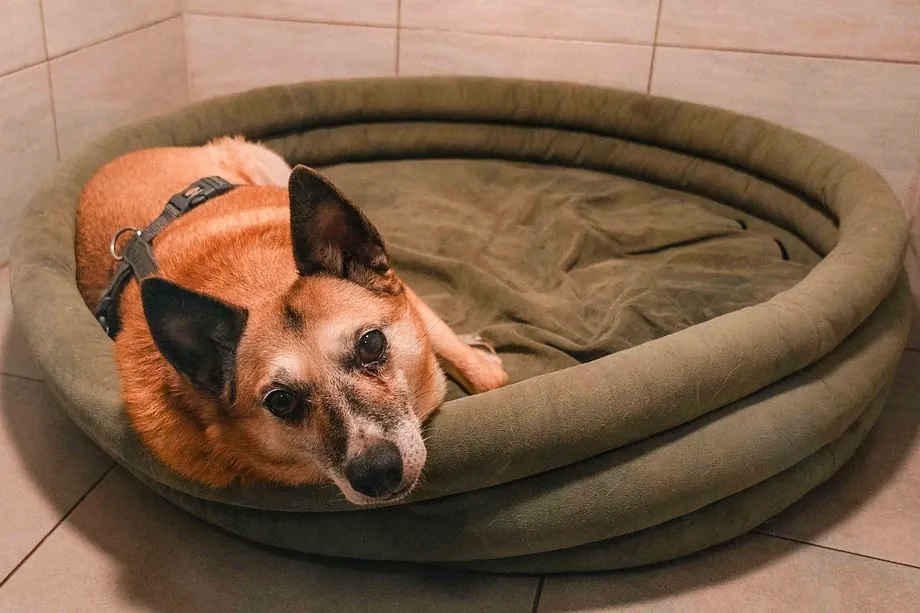When they open her kennel, the dog Sara frantically wags her tail, hitting it against the wooden walls. "This is the most affectionate dog we have. All the volunteers are in love with her," says Natalia, the center's director. Sara approaches us, and with her severed legs, she asks us to pet her. We do so for a while. "She needs more care than any other dog due to her mutilation. We have to lift her into a wheeled cart to take her out so she can move with her hind legs," comments Natalia.
The dog Sara, of undefined breed and with no known owner (possibly deceased), was found in a house bombed by the Russians south of the city of Vovchansk, in Ukraine, completely destroyed by the invaders, with a current population of zero. The dog had stepped on a mine known as a "petal," an explosive disguised as a tree leaf. When the rescuers from Patron Pet Center found her, her two front legs were severed and had started to heal, although she could only drag herself by pushing her body.
Now, this dog is looking for a family to take care of her, and the organization, which now has 120 dogs and 180 cats, is increasingly focused on international adoption. "60% of all our animals end up with foreign families. To achieve this, we handle all the necessary paperwork, vaccinate the animal, and sterilize it. If someone is interested in a dog or a cat, we facilitate their pick-up at a prearranged location without them having to come all the way to Kiev," the director explains.
Twice a day, dozens of volunteers and center workers take the dogs out for a walk in a Soviet-style amusement park, while others clean the kennels and distribute subsidized food, as well as veterinary care, funded by external organizations and thanks to the sale of tickets for concerts or yoga sessions with puppies around. The fact that these animals are still alive is not only due to the work done at this center but also to the military personnel or volunteers who rescued them from the bombed areas in time. "Some are still in shock," Natalia explains. Most of them come from the Kharkiv or Kherson region. The blowing up of the Kakhovka Dam by the Russians left many dogs and cats abandoned and isolated in flooded areas until volunteers rescued them. The 800-square-meter center has already become too small. Many animals have to share the space that should be for one, hence the plans to expand it. The goal, as she says, is to reach 300 spots for cats and 200 for dogs.
The scars of war are visible to the naked eye. Inna is a shepherd dog trembling in fear at the sight of us. The interaction with humans has been broken in this animal. Many others suffer the same fate. Some become furious, show their teeth, and bark to defend their space and themselves. Only they know what they have been through. This aggression drops significantly when the door is opened, and they leave their kennel for their daily walk.
There are no small dogs or breeds associated with the city. Most are countryside animals rescued from bombed rural areas. This reporter has witnessed rescues of dogs that were tied up for days at the door of a property whose owner fled hastily, was injured, or died, meaning strong working or farm dogs accustomed to protecting homes or land, loyal to their owners, and well-trained to herd livestock or hunt small game.
In war-deserted areas, of which there are many in this invasion, the only ones left are these types of animals forming packs to protect and feed themselves. Some have become deaf due to explosions or are injured, which increases their dependence on the group. "In the case of the dog Inna, we noticed she was under immense stress, but then, during walks, she would approach another dog, and in its proximity, she would calm down. We later realized they had been part of the same pack and were rescued together. So we put them in the same kennel to live together, and she is gradually returning to normalcy thanks to that small gesture. We have to be very attentive to the behaviors of these dogs because it's as if they are telling us their story," Natalia comments.
Patron Pet Center was founded at the beginning of the Russian invasion to save the lives of these animals and prevent them from reproducing wildly and uncontrolled in war zones. Now, it aims to become one of the main tools for international adoption of dogs and cats.
